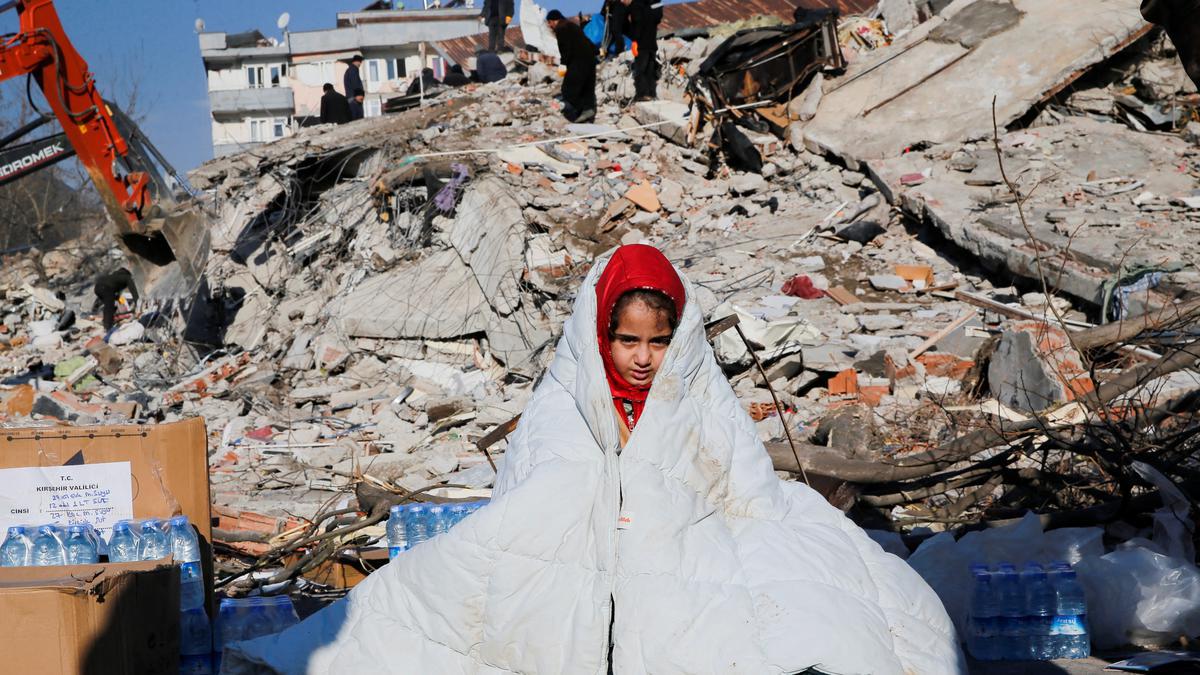
People keep warm by a fire as the search for survivors continues in the aftermath of a deadly earthquake in Kahramanmaras, Turkey.
| Photo Credit: Reuters
(This article forms a part of the View From India newsletter curated by The Hindu’s foreign affairs experts. To get the newsletter in your inbox every Monday, subscribe here.)
A global rescue effort is underway to aid Turkey and Syria after a devastating earthquake has tragically claimed thousands of lives. More than 30 countries are part of the relief effort, sending aircraft with relief, field hospitals, diggers, and rescue teams, including India, the U.S., U.K., Russia, China, Japan, Pakistan, Israel, and several European countries.
In this week’s World View, Suhasini Haidar examines India’s response to the latest tragedy, India’s previous disaster relief undertakings, as well as the diplomatic implications. You can read or watch her analysis here.

A girl sits near the site of a collapsed building following an earthquake in Kahramanmaras, Turkey.
| Photo Credit:
Reuters
The humanitarian aspect, no doubt, is and should remain the abiding and primary focus in such tragedies. As with every global disaster, there are also tangential diplomatic implications. For instance, India’s assistance to Turkey comes at a time when ties are still tense. Even so, as Haidar explains, the fact that the government put aside political considerations and sent aid, just as Turkey did in sending relief to India during its COVID crisis, does help the bilateral relationship.
Also read:
Jacob Koshy explains why the earthquakes were so deadly.
Suhasini Haidar on reporting on loss, grief and resilience during a tragedy.
The Top Five
What we are reading this week – the best of The Hindu’s Opinion and Analysis
- As U.S.-China ties plunge over the continuing fallout from the “spy balloon”, an editorial in The Hindu warns of the dangers of the current climate in relations between the world’s two biggest powers, and why, when the next crisis emerges, possibly over a sensitive issue such as Taiwan, finding an off-ramp will be a challenging task amid an intensifying rivalry and heated domestic discourse. In this podcast, we discussed the balloon incident, what may have happened, and China’s likely response.
- India’s connectivity projects with Bhutan, Bangladesh, Nepal and Myanmar have been accelerated due to its “obvious” concerns about the frontier with China, External Affairs Minister S. Jaishankar said last week. Suhasini Haidar explains how the government has been ramping up border infrastructure. China, meanwhile, has announced plans to build a railway line connecting Xinjiang and Tibet through the Aksai Chin region and close to the Line of Actual Control (LAC), one of several new routes announced last week as part of a long term plan to expand the railway network in Tibet.
- S. Akbar Zaidi on why Pakistan could be staring at its worst crisis in decades as it faces political and economic destabilisation and even the return of terror. The Hindu, in an editorial, writes that unless Pakistan’s governance structures refocus themselves to addressing long-term structural weaknesses in the economy and find ways to improve relations with neighbours such as India, the cyclicity of the economic problems will remain. But for that to happen, the military establishment has to take a back seat: a bleak prospect in the medium term.
- Pranav Satyanath looks at the future of India-U.S. space cooperation, and why the recent agreement to advance space collaboration in several areas, under the ‘initiative on critical and emerging technology’, comes at a crucial time for both countries.
- As India and France mark 25 years of their strategic partnership, Harsh Pant and Ankita Dutta take stock of a time-tested strategic relationship that has continued to gain momentum over shared values and aspirations of peace, stability and, most importantly, their desire for strategic autonomy.
















